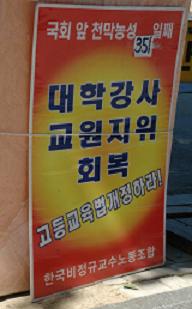Unequal treatment of part time instructors on campus
 |
PROFESSORS HAVE long been respected due to their expertise. Thus, people inside and outside campuses have certain fantasies about being a professor, as do aspiring professors. Inside the academic community, however, there exists an invisible discrimination between full time and part time instructors. The superficial difference between these two categories seems only to be the words “full” and “part”, but the inner difference is critical enough to be considered seriously within universities.
Part time instructors in universities
Part time instructors are those who provide lectures, and are paid per hour with non-permanent status. There is no guarantee, however, that all part time instructors will become full time instructors, and annual reappointment is not guaranteed. According to the bill, “A revision bill of the Higher Education Law,” proposed by the former member of the National Assembly Lee Joo-ho, part time instructors are in charge of 1/3 of the overall lectures on average. Comparing elective and major courses, part time instructors mostly teach the former, and this tendency is strongest in national, or public, universities. According to Lee’s book Research on the Actual Conditions of Part Time Instructors in Four Year Universities, 65.5% of the elective courses in national/public universities were taught by part time instructors, whereas the figure in private universities was lower at 47.1%. In the case of major courses, part time instructors in national / public universities taught 29.4% and taught 30.5% at private universities. Just by looking at the numerical figures, one can realize that the portion of part time instructors is large enough to be a major issue.
Hardships of part time instructors
Many part time instructors receive unfair treatment. “We receive no benefits from the institution except wages. For instance, for full time instructors, the expenses needed to participate in academic meetings are provided by the school, whereas we have to pay our own money. Even the basic insurance system that is provided for staff members is not provided to us,” says Kim Yong-sub (Sub-commissioner, Labor Union of Korea’s Part Time Instructors). According to former member of the National Assembly Lee, there is a 3.8 times wage gap between full time and part time instructors at national institutions. The average monthly income of these people is 1 million won, and thus barely exceeds the minimum cost of living, which is 939,849 won in the case of a three-member family. The situation for instructors in private universities is more serious, since the gap is approximately 4.47 times. “I earn about 1 million won per month. This is an income that my family cannot afford to live on. In order to teach my two kids, it is inevitable for my wife to work all day and night,” says Kim.
Some might allege differences of quality between full and part time instructors. However, most of the part time instructors have received excellent educations from remarkable institutions and the quality of their lectures does not differ from that of full time instructors. “There is no major difference in the quality of education that part time and full time instructors have received. Both have high qualifications to teach university students,” said Kim. “I feel no special difference between the quality of lectures given by full time and part time instructors,” says Choi Kang-san (Fresh., Div. of Humanities). Since there is no big difference in quality, a resolution to enhance the treatment of part time instructors is essential. Despite the quality lectures they provide, the current status of these people is unregulated. Therefore, part time instructors have no rights to protest against the absurd treatment they face because they are not currently under the category of formal employees.
A possible resolution for fair status
Therefore, the priority in such a change should be to guarantee the contractual status of part time instructors as formal teachers by law. “Universities are requiring people like us who have no status as teachers to take responsibility for the students. This is paradoxical behavior for an educational institution. Our status is being sacrificed in order to save the budgets of universities. A bill to protect our status is necessary,” says Kim. Universities should focus more on elevating the quality of education and guaranteeing the stable status of part time instructors rather than focusing on wage savings.
* * *
The biggest discrimination against minorities is not disregard but indifference. The status quo of part time instructors is unstable both in income and continuity. Despite the recommendation letter proposed by the National Human Rights Committee to the Ministry of Educational Science and Technology in 2004 that requests better and more suitable treatment, no big change has been made. Now is the time actually to take action. Without formal legislation, fair treatment for part time instructors will only be a utopian vision rather than a reality.
Part time instructor’s wages per hour
| University | Wage (Won) |
| Seoul Univ. | 42,500 |
| Pohang Univ. of Science and Technology | 45,000 |
| Hanyang Univ. | 40,000 |
| Chung-ang Univ. | 34,000 |
| Kyunghee Univ. | 38,000 |
| Ewha Womans Univ. | 44,000 |
| Dankook Univ. | 32,000 |
| Estimated monthly wage | 1 million |
(Part time instructors generally teach three to four hours of lectures per week.
Therefore, the average monthly wage can be estimated as above.)
Ministry of Educational Science and Technology, 2006
| Part time instructors in Yonsei Univ. 1. What is the proportion of teaching by part time instructors in Yonsei Univ.? Standardizing in the first semester of 2008, we had 61.1% full time instructors and 38.9% part time instructors on average. 2. How much is the wage for part time instructors? The basic wage is 50,600 won per hour. However, 25,300 won is added when lectures are conducted in English. Response given by: The Office of Academic Affairs |
| Special interview with Assemblyman Kwon Young-ghil Member of the National Assembly Kwon is currently focusing on submitting a bill to protect the rights of part time instructors. The contents of the bill are not finalized yet. However, the main idea in this bill is to acknowledge part time instructors as formal instructors. 1. What is being proposed in the National Assembly in order to reduce the unfair treatment of part time instructors in universities? The need to protect the rights of part time instructors was discussed in the 17th Congress but this did not lead to a successful conclusion. The Korean Democratic Labor Party and I are planning to pass a bill in the 18th congress that includes legal recognition of part time instructors as formal-status teachers. 2. What are the possible resolutions to guarantee the rights of part time instructors? The principle of equal wages for equal value of labor should be established in universities. Moreover, the discrimination in wages and status between part time and full time instructors should be abolished. Since this is a problem that cannot be solved in a short time, gradual efforts are necessary. However, the foremost change needed is the guarantee of formal status as an instructor. |
 |
Cho Hee-soo
groovedannie@naver.com

